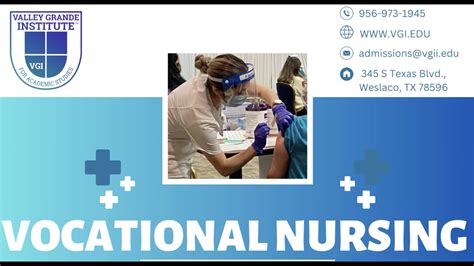Intro
Unlock the world of nursing with our comprehensive guide to Licensed Vocational Nursing (LVN). Discover the roles, responsibilities, and requirements of an LVN, including education, training, and certification. Learn about the differences between LVNs and RNs, and explore the career paths and salary ranges for vocational nurses in various healthcare settings.
Licensed Vocational Nurses (LVNs) play a vital role in the healthcare system, providing essential care and support to patients in a variety of settings. Despite their importance, many people are unclear about the role and responsibilities of LVNs, as well as the education and training required to become one. In this article, we will delve into the world of Licensed Vocational Nursing, exploring the benefits, working mechanisms, and key information related to this rewarding career.

What is an LVN?
A Licensed Vocational Nurse (LVN) is a healthcare professional who provides basic nursing care to patients under the supervision of a registered nurse (RN) or a licensed physician. LVNs work in a variety of settings, including hospitals, clinics, nursing homes, and private practices, and are responsible for administering medications, taking vital signs, and providing wound care, among other tasks.
LVN vs. LPN: What's the Difference?
While the terms "LVN" and "LPN" are often used interchangeably, they are not exactly the same thing. LVN stands for Licensed Vocational Nurse, which is the term used in California and Texas, while LPN stands for Licensed Practical Nurse, which is used in the rest of the United States. Despite the difference in terminology, the roles and responsibilities of LVNs and LPNs are similar.
Benefits of Becoming an LVN
There are many benefits to becoming an LVN, including:
- Job stability: The demand for LVNs is high, and the job outlook is excellent, with the Bureau of Labor Statistics predicting a 12% growth in employment opportunities through 2028.
- Competitive salary: LVNs are typically well-compensated, with median salaries ranging from $40,000 to over $60,000 per year, depending on location and experience.
- Variety of work settings: LVNs can work in a variety of settings, including hospitals, clinics, nursing homes, and private practices, which can provide a change of pace and prevent boredom.
- Personal satisfaction: LVNs have the opportunity to make a real difference in the lives of their patients, which can be incredibly rewarding.

How to Become an LVN
To become an LVN, you will need to complete a state-approved vocational nursing program, which typically takes one year to complete. These programs are offered at community colleges and vocational schools, and include both classroom and clinical training.
- Step 1: Meet the Prerequisites: Most vocational nursing programs require applicants to have a high school diploma or equivalent, as well as a minimum GPA and prerequisite courses in math and science.
- Step 2: Complete the Program: The vocational nursing program will include both classroom and clinical training, and will cover topics such as anatomy, physiology, and pharmacology.
- Step 3: Pass the NCLEX-PN Exam: After completing the program, you will be eligible to take the NCLEX-PN exam, which is required for licensure.
- Step 4: Obtain Licensure: After passing the NCLEX-PN exam, you will be issued a license to practice as an LVN in your state.
LVN Education and Training
LVN education and training programs are designed to provide students with the knowledge and skills necessary to become a licensed vocational nurse. These programs typically include:
- Classroom instruction: Students will receive classroom instruction in topics such as anatomy, physiology, and pharmacology.
- Clinical training: Students will participate in clinical training, which will provide hands-on experience in a healthcare setting.
- Lab training: Students will also participate in lab training, which will provide hands-on experience with medical equipment and procedures.

LVN Specializations
LVNs can specialize in a variety of areas, including:
- Pediatrics: LVNs who specialize in pediatrics work with infants, children, and adolescents, providing care and support in a variety of settings.
- Gerontology: LVNs who specialize in gerontology work with older adults, providing care and support in a variety of settings.
- Rehabilitation: LVNs who specialize in rehabilitation work with patients who are recovering from illness or injury, providing care and support to help them regain their strength and mobility.
LVN Certifications
LVNs can obtain certifications in a variety of areas, including:
- IV certification: LVNs who obtain IV certification are trained to administer medications and fluids through intravenous lines.
- Wound care certification: LVNs who obtain wound care certification are trained to provide care and treatment for wounds, including dressing changes and wound cleaning.
- Phlebotomy certification: LVNs who obtain phlebotomy certification are trained to collect blood samples from patients for laboratory testing.

LVN Job Outlook
The job outlook for LVNs is excellent, with the Bureau of Labor Statistics predicting a 12% growth in employment opportunities through 2028. This growth is due to an increased demand for healthcare services, as well as an aging population.
- Job growth: The Bureau of Labor Statistics predicts a 12% growth in employment opportunities for LVNs through 2028.
- Job stability: LVNs are in high demand, and the job outlook is excellent, providing job stability and security.
- Competitive salary: LVNs are typically well-compensated, with median salaries ranging from $40,000 to over $60,000 per year, depending on location and experience.

Conclusion
In conclusion, becoming an LVN can be a rewarding and challenging career, with many benefits and opportunities for advancement. By completing a state-approved vocational nursing program, passing the NCLEX-PN exam, and obtaining licensure, you can start your career as an LVN and make a real difference in the lives of your patients.
We encourage you to share your thoughts and experiences with us in the comments below. If you have any questions or would like to learn more about becoming an LVN, please don't hesitate to reach out.
What is the difference between an LVN and an RN?
+L VN stands for Licensed Vocational Nurse, while RN stands for Registered Nurse. LVNs are trained to provide basic nursing care, while RNs are trained to provide more advanced care and are often responsible for supervising LVNs.
How long does it take to become an LVN?
+The length of time it takes to become an LVN can vary depending on the program and the individual's circumstances. However, most vocational nursing programs take one year to complete.
What is the job outlook for LVNs?
+The job outlook for LVNs is excellent, with the Bureau of Labor Statistics predicting a 12% growth in employment opportunities through 2028.
